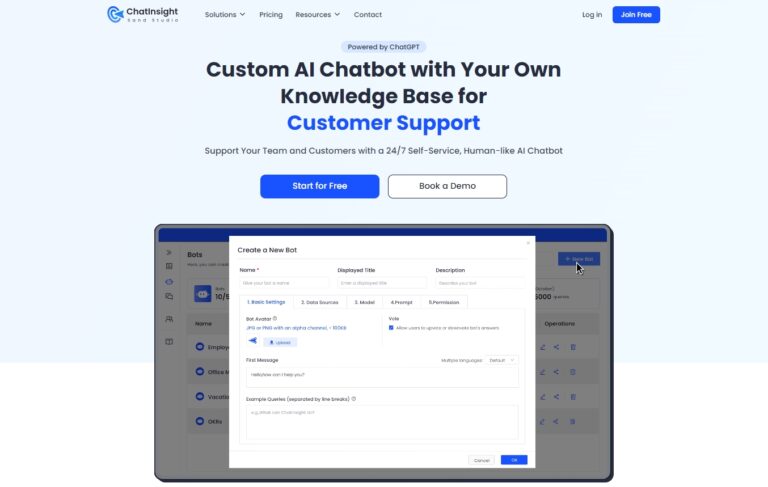Discover the Power of AI in Revolutionizing E-commerce
In 2023, every e-commerce business is negotiating the ever-expanding digital marketplace. It incorporates AI (Artificial Intelligence), critical for long-term growth and competitive advantage. Thus, we have listed the best AI tools for e-commerce companies here.
- Part 1: How is AI Changing the E-commerce Industry?
- Part 2: The Benefits of Using Artificial Intelligence in E-commerce
- Part 3: 5 Top AI Ecommerce Tools for Business Growth

- Part 4: Steps to Implement Artificial Intelligence with E-Commerce
- Part 5: Use Cases for AI in E-commerce
- Part 6: How AI Improve E-commerce in the Future?
- FAQs: Frequently Asked Questions
Part 1: How is AI Changing the E-commerce Industry?
Many significant examples in the e-commerce area use AI's power to improve their user experience. One of the unavoidable ones is Amazon! If you want to know about some technicalities, Amazon’s product recommendations are enabled with the help of artificial intelligence in e-commerce.
In contrast to product recommendation, AI is used by the e-commerce industry for various reasons, including:
- Chatbot services;
- Analysing customer comments;
- Personalised services, and more.
With the advent of AI, many consumers are willing to make new purchases from a Chatbot and look for the offers they provide. You will be surprised to know that AI technologies have effectively handled about 80% of customer interactions in recent years. It doesn’t have a human-agent part. In e-commerce businesses, AI predicts the shopping patterns of the shoppers and then facilitates tailored buying options according to each buyer’s previous activities.
Moreover, various AI-enabled digital assistants like Google Duplex have developed numerous capabilities. One such example is creating grocery lists or even placing customer orders. One crucial task for any e-commerce business is inventory management to track product details appropriately. Thus, you can see that the integration of AI is significantly impacting the e-commerce industry.
Part 2: The Benefits of Using Artificial Intelligence in E-commerce
The following are some significant advantages of implementing AI in an e-commerce business:
Voice Assistants and Voice Commerce
If you want to add more convenience, accessibility, and better engagement to your e-commerce business sites, AI voice assistants should be your first choice. With its integration, you can adequately boost the user experience and enable the users to search naturally for the items and make the right purchases. It will result in increased sales and client satisfaction.
Inventory Management
Another significant advantage of implementing AI in your e-commerce website is improving inventory management. It is possible by adequately forecasting the demand, automating restocking operations, and efficiently minimising the overstock and stockouts. It increases efficiency and lowers costs by satisfying customers' needs promptly.
Fraud Detection and Prevention
One of the crucial concerns in an e-commerce store is detecting fraud. AI technology helps any online business to appropriately identify fraud by examining various aspects like transaction patterns, preventing illegal activity, and determining abnormalities. It is a strategy that will protect sensitive data and ensure protected transactions.
Effective Automation
Automation is an undeniable and vital benefit of using artificial intelligence algorithms in your e-commerce setups. AI-powered automation helps optimise these platforms, from order fulfilment to trusted customer support. It will lower your operating expenses and help you achieve strategic goals efficiently.
Remarketing To Potential Prospects
After the complete examination of user behaviours and preferences, AI e-commerce enterprises use can help with remarketing campaigns. It guides the companies to target their potential consumers with more personalised suggestions and increases the chances of conversion. It is a full-proof data-driven strategy that allows for a significant boost in the marketing ROI.
Part 3: 5 Top AI Ecommerce Tools for Business Growth
In this section, you will see some practical AI e-commerce tools for successful business growth:
1 Customer Service Chatbot - ChatInsight AI
ChatInsight AI is one of the eminent AI tools that can enhance the results and overall growth of an e-commerce business. It can be customised by companies using their knowledge base for various purposes, including marketing, customer support, IT helpdesk, and more. Its exceptional feature of using multiple languages helps e-commerce platforms target different locations appropriately.
Key Features
- Provides assistance for employee support, customer support, IT support, marketing, and sales.
- Cost-effective solution for answering repeating questions.
- Supports multiple languages without manual configuration.
- Always available for support, 24/7.
- Improves user experience with accurate and helpful responses.

2 Analytics and Predictive modelling - DataRobot
The AI solution that can make a difference in e-commerce businesses with its integration is DataRobot. It is a unified platform for both Generative and Predictive AI. It is a value-driven tool that will empower organisations with better scalability and unparalleled enterprise control and monitoring.

3 Email marketing - Bluecore
Bluecore can be an excellent AI tool for email marketing for e-commerce businesses wanting to increase their conversion and revenue faster. It is a platform that helps enterprises create one-to-one campaigns that can impact revenue. With its use, any e-commerce business can be a part of a robust online retail community.

4 Content optimisation - Surfer AI
Another excellent AI tool that one can use for one's e-commerce platform is Surfer AI. It is a great solution for the content optimisation of websites and landing pages. Surfer AI uses NLP and some generative AI models. Besides, the data-driven suggestions provide help for optimising the content.

5 Generated videos - Synthesia
Last but not least, the AI e-commerce tool on the list is Synthesia. It helps e-commerce stores with various aspects, including AI-generated videos, tutorials, marketing videos, interactive product demos, and more. The users can generate the videos in seconds by providing a few details about their company.

Part 4: Steps to Implement Artificial Intelligence with E-Commerce
- Step 1.Recognise Your Business Aims & Challenges
- Firstly, you must identify your business's goals and challenges before implementing AI in e-commerce. It is practical to use AI for the companies' best-suited needs.
- Step 2.Find Out Relevant Data Sources
- The next essential step is to look for the relevant data sources. Some things that are included in it are product data, customer sales data, and market data.
- Step 3.Select an AI Solution
- Now is the time to decide and choose an AI solution that will suit your e-commerce business. You must ensure that the tool you select matches your specific requirements.
- Step 4.Prepare Data To Do Analysis
- Before implementing artificial intelligence in e-commerce, preparing the data for analysis is vital. It helps businesses clean and organise the data correctly.
- Step 5.Do The Training of AI Model
- After effectively preparing your data, train your AI model. It is about feeding your AI system with the most relevant data. It allows businesses to make the proper recommendations and predictions.
- Step 6.Do The Testing of AI Model
- After providing complete training to your AI model, you should test it and ensure it functions correctly. It can include A/B testing, checking the performance, etc.
- Step 7.Implementation of AI Solution
- When you are satisfied with testing your AI models, you should implement them in your e-commerce platform. It can comprise the integration to your e-commerce websites, mobile app, and other platforms.
- Step 8.Monitoring & Optimising Performance
- The last step is about continuous monitoring and optimisation of the AI solution that you implemented in your e-commerce platform. It will help with the perfect functioning of AI in your online stores.
Part 5: Use Cases for AI in E-commerce
This part contains information about the essential use cases for AI in e-commerce platforms:
1 Enhance Product Data
In the e-commerce industry, having the right product data is crucial. It makes a significant difference in offering client satisfaction and boosts an overall shopping experience. One of the eminent online platforms, Constructor, has also mentioned in a report that about 60% of the shoppers are looking for a better experience regarding relevant product discovery.
2 Better Assistance to Shoppers
Many people get confused while shopping online and face some common issues often. Chatbots and shopping assistants are the key to providing them with an environment where they can go to make purchases as they want. These tools have integrated algorithms that help them fetch the search results quickly according to the user intent.
3 Setting Dynamic Pricing
Dynamic product pricing for individual buyers is crucial. It is because every e-commerce business wants to consider every customer according to their needs. It is a great way to give first-time buyers more exciting discounts than competitors. The AI solution you use in your online platforms can do such implementations for you and appropriately handle the dynamic pricing for different consumer accounts online.
4 Improve Inventory Management & Forecast Sales
Undoubtedly, the product catalogues in an e-commerce business are ever-changing. It needs some serious attention when it comes to managing the inventory for each product. An AI solution for your business can benefit from better inventory management and sales forecasting. It can analyse sales, predict quick solutions, identify market changes that could affect sales, and more.
Part 6: How AI Improve E-commerce in the Future?
In recent years, online stores have significantly transformed by integrating artificial intelligence in e-commerce. Also, online companies will see many more changes using the same technology as it evolves. It promises to improve the user experience with seamless operations. With this technology, businesses get advanced algorithms to effectively evaluate user activity, purchase history, and preferences, which will help make targeted product recommendations. It caters to the client's needs and also increases sales.
Moreover, it will be transformed by implementing more improved customer support. The virtual assistance will be better with time and will manage the customer queries more effortlessly and thoughtfully. Besides, one of the significant factors still making it the best for e-commerce business is the availability 24/7. This way, enterprises consistently stay in touch with their potential and existing consumers. Therefore, companies should start adding it to their online platforms where they want to target and sell their products strategically.
Conclusion
All the tools mentioned above can help organisations revolutionise their business operations efficiently. Enterprises that use them strategically can benefit by attaining more growth and staying ahead in the competitive online e-commerce environment.
Besides, the future of AI in e-commerce is ever-evolving and opens the doors for better efficiency, more revenue, and a smooth customer journey. Thus, if you are also interested in getting benefits for your business and consumers, try integrating AI into your business platform.




Leave a Reply.